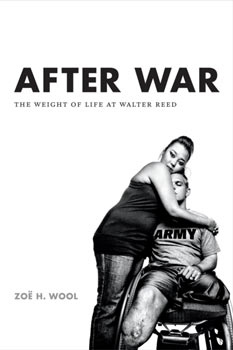Rice University
Office of Public Affairs / News & Media Relations
EXPERT ALERT
David Ruth
713-348-6327
david@rice.edu
Amy McCaig
713-348-6777
amym@rice.edu
Rice anthropologist weighs in on veterans’ life after the fighting ends
HOUSTON – (Nov. 10, 2015) – What’s life really like for soldiers after the fighting ends? Rice anthropologist Zoë Wool is available to discuss this topic, which is the subject of her recent book, “After War.”
n the book, Wool explores how America’s most severely injured soldiers struggle to return to ordinary life while recovering from extraordinary wounds at Walter Reed National Military Medical Center. She said that one of the real challenges for soldiers is living up to the stereotype most Americans believe – the idea all soldiers are pro-government “patriots” who support their government and military, no questions asked.
“In the U.S., there is no compulsory military service and, since 1973, no draft,” Wool said. “Soldiers inhabit a public imaginary that – especially in times of national anxiety – binds them to an exceptional form of personhood inflected with heroism and patriotic commitment.”
Wool, an assistant professor of anthropology, said that over the course of her fieldwork, she realized that this traditional American profile of a soldier and what motivates him to serve his country is not always consistent with who soldiers actually are and their political views.
“Unfortunately, if a soldier doesn’t live up to this stereotype, it can affect how he is treated, both by veterans organizations and the public at large,” she said.
Wool noted that a number of veterans she worked with actually felt uncomfortable with the amount of attention they received for their “heroic” behavior.
“The guys I spent time with made it clear that being a soldier was their job — a job unlike others in many ways, but they thought of their injuries as having happened as part of their job, rather than being the outcome of patriotic sacrifice,” Wool said. “While glad to have recognition denied their Vietnam-era counterparts, they felt guilt when receiving special treatment or excessive attention couched in the language of gratitude and sacrifice.”
For more information or to schedule an interview with Wool, contact Amy McCaig, senior media relations specialist at Rice, at 713-348-6777 or amym@rice.edu.
-30-
Follow Rice News and Media Relations on Twitter @RiceUNews.
Related materials:
Zoe Wool bio: http://bit.ly/1NIspot
Duke Press blog post: http://bit.ly/1ROu2QA
Located on a 300-acre forested campus in Houston, Rice University is consistently ranked among the nation’s top 20 universities by U.S. News & World Report. Rice has highly respected schools of Architecture, Business, Continuing Studies, Engineering, Humanities, Music, Natural Sciences and Social Sciences and is home to the Baker Institute for Public Policy. With 3,888 undergraduates and 2,610 graduate students, Rice’s undergraduate student-to-faculty ratio is 6-to-1. Its residential college system builds close-knit communities and lifelong friendships, just one reason why Rice is ranked No. 1 for best quality of life and for lots of race/class interaction by the Princeton Review. Rice is also rated as a best value among private universities by Kiplinger’s Personal Finance. To read “What they’re saying about Rice,” go here.


